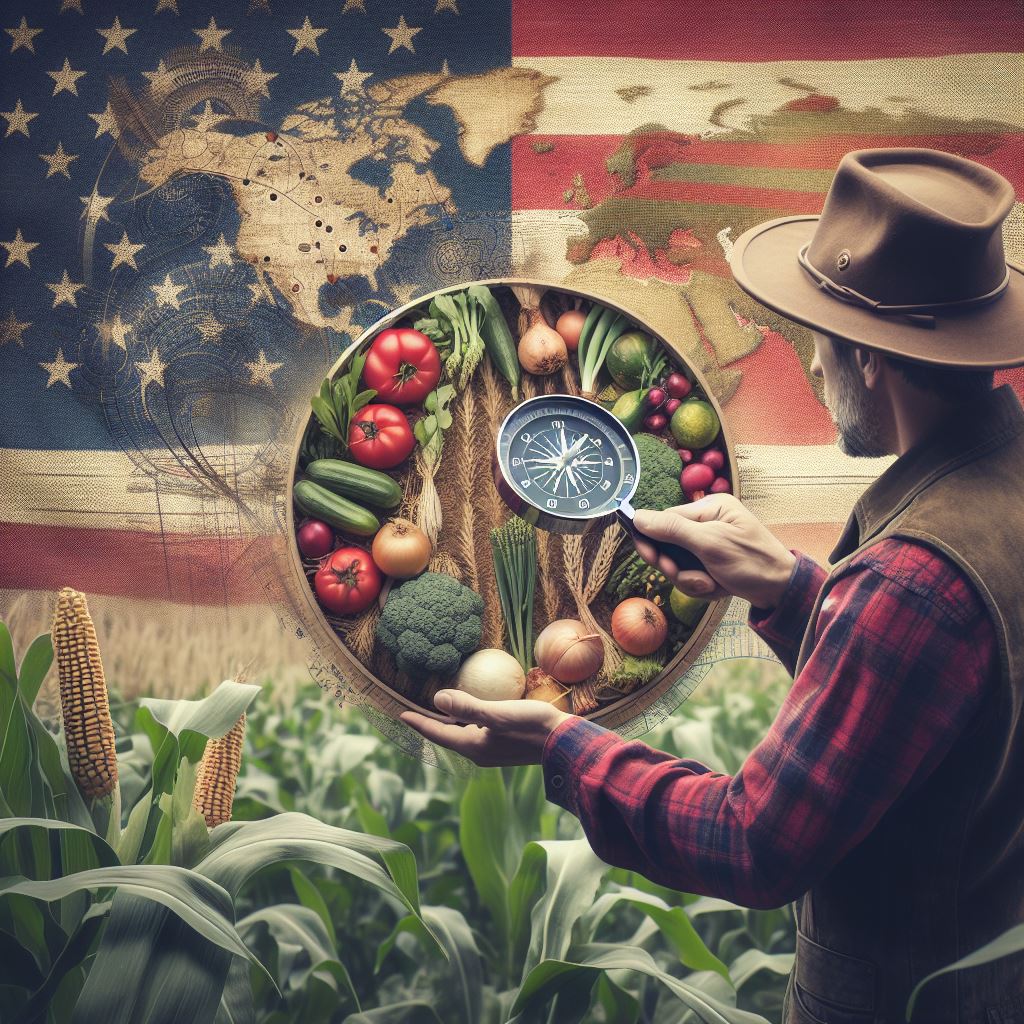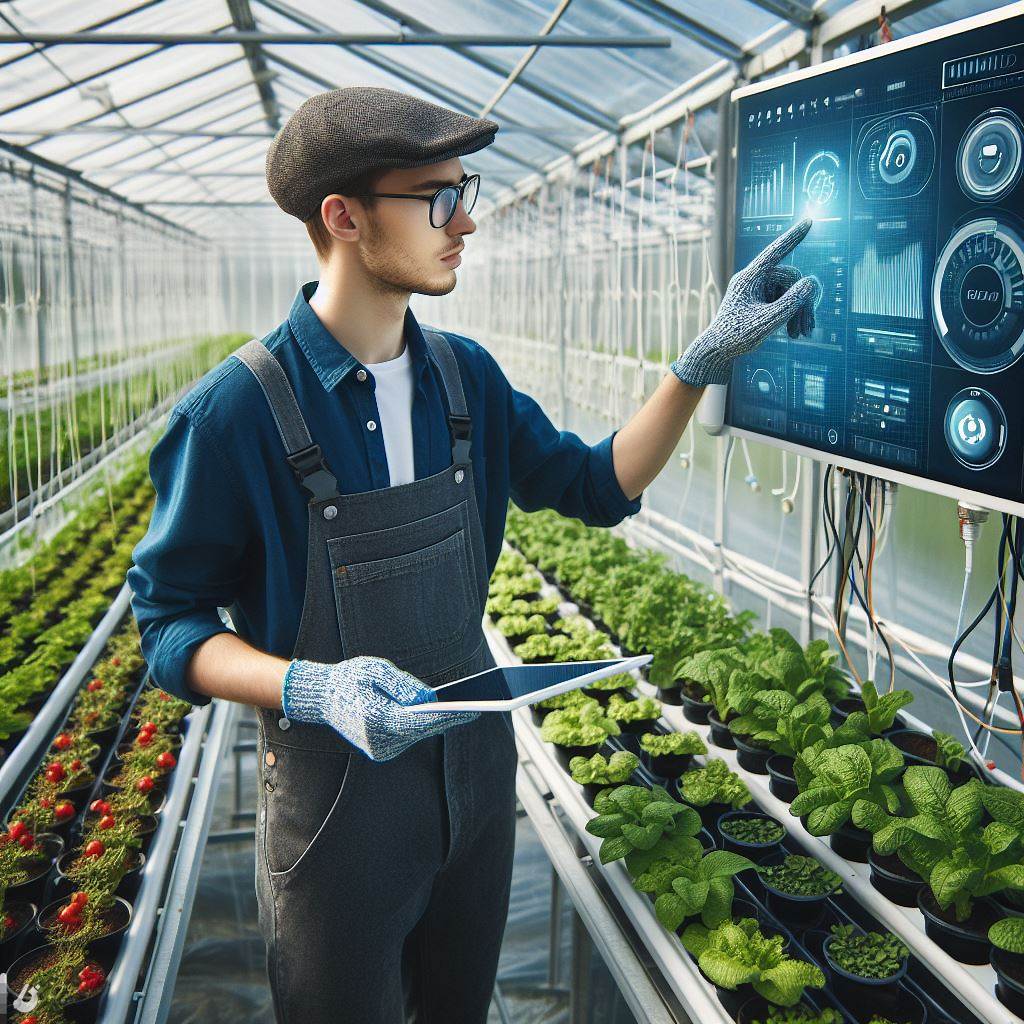Introduction
AgriBusiness integrates agriculture and business, ensuring the production, processing, and distribution of agricultural products.
The synergy of tradition and technology is pivotal, fostering productivity, efficiency, and sustainability:
- Holistic Approach: AgriBusiness encompasses the entire system, from production to distribution, playing a vital societal role.
- Traditional Foundation: Tradition, rooted in generational knowledge, forms the basis, sustaining high-quality, time-tested agricultural practices.
- Technological Revolution: In today’s digital age, technology revolutionizes AgriBusiness, optimizing processes, enhancing efficiency, and enabling precision agriculture.
- Merging Wisdom: Combining tradition and technology is crucial, offering innovative solutions to address challenges like climate change and food security.
- Cultural Preservation: Traditional practices contribute to cultural heritage and biodiversity conservation, ensuring a sustainable and prosperous future.
By embracing technology and preserving tradition, AgriBusiness achieves sustainable growth, adapts to market demands, and secures a competitive position.
The integration of traditional wisdom with modern tools ensures a dynamic and prosperous future for the agricultural industry.
Traditional approaches in AgriBusiness
Overview of traditional farming practices
Traditional farming practices have been the backbone of AgriBusiness for centuries, passed down through generations.
These practices involve manual labor, such as tilling the soil and planting seeds by hand.
Farmers also rely on natural fertilizers, such as animal manure and compost, to enrich the soil.
Crop rotation is another common traditional practice that helps maintain soil fertility and prevent pest and disease outbreaks.
Traditional farmers often cultivate a variety of crops, promoting biodiversity and reducing the risk of crop failure.
Furthermore, they rely on natural pest control methods, such as introducing beneficial insects or using homemade herbal concoctions.
Traditional farmers typically work closely with nature, observing seasonal patterns and adjusting their farming practices accordingly.
Benefits and limitations of traditional approaches
Benefits
Traditional approaches in AgriBusiness have several advantages that contribute to sustainable farming:
- Preservation of cultural heritage: Traditional farming practices preserve cultural knowledge and traditions, ensuring their continuity.
- Environmental sustainability: Traditional farmers prioritize organic and sustainable methods, minimizing the use of synthetic inputs and reducing environmental impact.
- Cost-effectiveness: Traditional approaches often require fewer expenses on machinery, chemical inputs, and genetically modified seeds.
- Local food production: Traditional farming practices promote local food consumption, reducing carbon emissions associated with long-distance transportation.
Limitations
While traditional approaches in AgriBusiness offer numerous benefits, they also face certain limitations:
- Limited productivity: Traditional farming methods may yield lower crop production compared to modern, technology-driven approaches.
- Vulnerability to climatic changes: Traditional farmers often face difficulties adapting to extreme weather conditions and unpredictable climate patterns.
- Labor-intensive: Traditional farming practices rely heavily on manual labor, demanding significant physical effort and time commitment.
- Market competition: In today’s competitive market, traditional farmers often struggle to compete against larger-scale, industrialized farming operations.
Despite these limitations, many farmers still embrace traditional approaches, recognizing their value and contribution to sustainable agriculture.
Agricultural technology and innovation can enhance traditional farming practices rather than replace them, creating a harmonious balance between tradition and technology in AgriBusiness.
Transform Your Agribusiness
Unlock your farm's potential with expert advice tailored to your needs. Get actionable steps that drive real results.
Get StartedIn short, traditional approaches in AgriBusiness have played a vital role in the development of agriculture.
They offer numerous benefits such as preserving cultural heritage, promoting sustainability, and supporting local food systems.
While they may face limitations in terms of productivity and adaptability, integrating technology can help overcome these challenges.
The merging of tradition and technology holds great promise for the future of AgriBusiness, ensuring its continued growth and sustainability.
Read: Agribusiness Export Strategies 101
The Role of Technology in AgriBusiness
Overview of Technological Advancements in Agriculture
As AgriBusiness continues to evolve, technology plays a pivotal role in its transformation.
Technological advancements have revolutionized the way agriculture is practiced, improving efficiency, reducing costs, and increasing productivity.
One significant development is the use of precision agriculture, which involves the integration of GPS, sensors, and data analytics.
This technology enables farmers to optimize the use of inputs such as water, fertilizer, and pesticides, thereby minimizing waste and maximizing yields.
Furthermore, drone technology has transformed the way farmers monitor their fields.
Drones equipped with high-resolution cameras provide real-time aerial images, allowing for early detection of crop diseases, pests, or nutrient deficiencies.
This enables farmers to take prompt action and prevent extensive damage.
Another area where technology has made a profound impact is in the realm of genetic engineering.
Scientists have developed genetically modified crops that possess desirable traits such as drought resistance, pest resistance, and increased nutritional value.
These genetically modified organisms (GMOs) have the potential to address food security challenges and improve crop quality.
In addition to these advancements, robotics and automation have transformed various agricultural processes.
Robots are now capable of performing tasks such as seeding, harvesting, and even milking cows.
This not only reduces the labor-intensive nature of farming but also increases precision and consistency in operations.
Overall, these technological advancements have empowered farmers with valuable insights and tools to make informed decisions, resulting in increased profitability and sustainability in AgriBusiness.
Benefits and Potential Drawbacks of Adopting Technology
While the adoption of technology in AgriBusiness offers numerous benefits, it is essential to consider potential drawbacks and challenges that may arise.
One of the significant advantages of technology adoption is increased efficiency.
By automating tasks and utilizing data-driven insights, farmers can optimize their operations, saving time and resources.
This leads to higher productivity and ultimately higher profits.
Moreover, technology enables farmers to mitigate risks associated with factors beyond their control, such as weather conditions and market fluctuations.
Showcase Your Farming Business
Publish your professional farming services profile on our blog for a one-time fee of $200 and reach a dedicated audience of farmers and agribusiness owners.
Publish Your ProfileWith real-time data and predictive models, farmers can make proactive decisions, minimizing losses and maximizing yields.
Additionally, technology has the potential to improve sustainability in AgriBusiness.
By using precision agriculture techniques, farmers can minimize the use of inputs such as water and chemicals, reducing the environmental impact and conserving resources for future generations.
However, implementing technology in AgriBusiness may also pose challenges.
The initial investment required for adopting advanced technologies can be prohibitive for smaller-scale farmers.
This may create a digital divide, where only larger farms have access to the benefits of technology.
Furthermore, there are concerns regarding the ethical and regulatory aspects of genetic engineering.
The potential risks associated with GMOs and their impact on human health and the environment need to be thoroughly assessed before widespread adoption.
Moreover, there is a need to ensure that technology is accessible and user-friendly for all farmers, regardless of their technical expertise.
Adequate training and support systems should be in place to enable farmers to harness the full potential of technology.
In fact, technology plays a crucial role in transforming AgriBusiness.
Technological advancements such as precision agriculture, drones, genetic engineering, and robotics have revolutionized farming practices, increasing efficiency and sustainability. While the adoption of technology offers numerous benefits, it is essential to address potential drawbacks and ensure equitable access and support for all farmers.
Read: Hydroponics: Revolution in Farming
Examples of technology in AgriBusiness
Precision agriculture and its impact
Precision agriculture has revolutionized the way farmers approach crop production, leading to increased efficiency and reduced environmental impact.
- Soil and yield mapping allow farmers to identify variations in nutrient levels and plan accordingly.
- GPS technology helps optimize the use of fertilizers, minimizing waste while maximizing crop health.
- Automated irrigation systems ensure plants receive the right amount of water, reducing water usage and costs.
- Variable rate technology adjusts seed and chemical application, tailoring it to the specific needs of each portion of the field.
- Real-time monitoring systems track weather, temperature, and moisture levels, providing valuable insights for decision-making.
Use of drones and remote sensing in farming
Drones equipped with high-resolution cameras and sensors are transforming various aspects of agricultural practices.
- Aerial imagery captured by drones offers a bird’s-eye view of the entire farm, detecting crop stress and disease.
- Drones aid in precision spraying, targeting specific areas with pesticides or fertilizers, reducing waste and protecting the environment.
- Remote sensing technology helps analyze vegetation indices, allowing farmers to monitor crop health and predict yields.
- Drones provide rapid surveillance and assessment of livestock, helping farmers identify injured or missing animals.
- The use of unmanned aerial vehicles saves time and labor, enabling farmers to cover larger areas quickly.
Data analytics for improved decision-making
AgriBusinesses are now leveraging data analytics to make informed decisions and optimize their operations.
- Collection and analysis of farm data enables farmers to identify patterns and trends, leading to better crop management.
- Predictive modeling helps forecast market demands, allowing farmers to plan production and mitigate risks.
- Data-driven insights aid in managing and optimizing the supply chain, ultimately reducing costs and improving efficiency.
- Machine learning algorithms analyze vast amounts of data and provide recommendations on irrigation, pest control, and harvesting methods.
- Real-time data monitoring facilitates instant adjustments in farming practices, maximizing productivity and profitability.
In general, technology is becoming increasingly integrated into AgriBusiness, transforming traditional farming practices.
Precision agriculture, the use of drones and remote sensing, and data analytics are all examples of how technology is driving innovation in the industry.
By leveraging these advancements, farmers can make more informed decisions, optimize their operations, and sustainably meet the growing demands of the global population.
Embracing technology is essential for the future of AgriBusiness, merging tradition and tech to ensure efficient and environmentally friendly practices.
Read: Agri-Tourism: A Growing Income Source

Balancing tradition and technology in Agribusiness
Integrating traditional and modern farming techniques
The world of Agribusiness is undergoing a significant transformation as farmers strive to find the delicate balance between traditional farming practices and emerging technologies.
Traditional farming techniques have been passed down from generation to generation, forming the backbone of agricultural practices in many regions.
However, with the advent of modern technology, farmers are now able to incorporate innovative techniques into their operations, increasing efficiency and productivity.
The challenge lies in integrating these modern techniques without disregarding the wisdom and sustainability of traditional farming methods.
By combining the best of both worlds, farmers can optimize their yields while preserving the cultural and environmental significance of traditional practices.
For example, farmers can adopt precision agriculture technologies to precisely apply fertilizers and pesticides using GPS-guided equipment, while still adhering to organic farming principles.
Preserving sustainable practices while embracing technology
Agriculture has always been intertwined with sustainability, ensuring the long-term viability of food production for future generations.
- Traditional farming practices often prioritize sustainable methods, such as crop rotation and natural pest control, to maintain soil health and minimize environmental impact.
- However, as agribusiness evolves, incorporating technology can lead to potential conflicts with sustainable practices.
- Balancing the use of technology with sustainable farming requires a careful evaluation of each innovation’s impact on the environment and overall ecosystem.
- Embracing precision agriculture techniques allows farmers to minimize inputs like water and pesticides by applying them only where and when necessary, preserving the delicate ecological balance.
Moreover, technology can aid in the development of sustainable alternative energy sources, such as solar-powered irrigation systems, reducing the carbon footprint of agricultural operations.
Challenges and solutions in merging tradition and tech
Though the integration of tradition and technology in Agribusiness brings numerous benefits, it also comes with its fair share of challenges.
- One of the major hurdles is bridging the knowledge gap between generations, ensuring that technological advancements are effectively adopted by traditional farmers.
- Training programs and knowledge-sharing initiatives can play a crucial role in empowering farmers to embrace technology while leveraging their existing expertise.
- Additionally, the cost of implementing new technologies can be a barrier for small-scale farmers. Collaboration between governments, NGOs, and private sectors could provide financial support and resources.
- Standardization and regulation of farming technologies can also streamline the integration process, establishing guidelines for sustainable and responsible adoption.
- While technological advancements offer incredible opportunities, it is essential to exercise caution and maintain critical thinking to avoid blindly following trends that may not align with the principles of sustainable agriculture.
Basically, achieving a harmonious balance between tradition and technology in Agribusiness is crucial for the future of sustainable food production.
By integrating traditional and modern farming techniques, preserving sustainable practices, and addressing associated challenges, farmers can optimize their operations while mitigating environmental impact.
Read: Climate-Smart Crops for Diversification
The Future of AgriBusiness
Predictions for the future of AgriBusiness
- Increasing global population will drive the demand for efficient and sustainable agricultural practices.
- Technology advancements, such as precision agriculture and artificial intelligence, will revolutionize farming methods.
- The use of drones and robotics will enhance productivity and reduce labor costs in the agricultural sector.
- Vertical farming and hydroponics will become more prevalent, allowing for year-round crop production in urban areas.
- The adoption of blockchain technology will improve transparency and traceability in the supply chain.
Opportunities for innovation and growth
- AgriBusiness will witness the emergence of smart farming systems, enabling real-time monitoring and decision-making based on data analytics.
- Integration of Internet of Things (IoT) devices will enable farmers to remotely manage and control agricultural operations.
- Development and utilization of bio-based fertilizers and pesticides will contribute to sustainable and eco-friendly farming practices.
- AgriTech startups will continue to flourish, offering innovative solutions in areas such as farm management, crop yield optimization, and livestock management.
- Collaboration between AgriBusiness and tech companies will drive research and development, leading to breakthrough innovations.
Importance of continuous adaptation and learning
- AgriBusiness professionals need to stay updated with the latest technological advancements and market trends.
- Investing in research and development is crucial for improving agricultural productivity and reducing environmental impact.
- Embracing lifelong learning and acquiring new skills will enable individuals to navigate the evolving landscape of AgriBusiness.
- Collaboration between traditional farmers and tech-savvy professionals will facilitate knowledge transfer and accelerate innovation.
- Governments and educational institutions should promote and support training programs that equip individuals with the necessary skills for the future of AgriBusiness.
In essence, the future of AgriBusiness holds immense potential for growth and innovation.
Predictions indicate a shift towards more sustainable and technology-driven farming practices.
Opportunities for innovation lie in the integration of advanced technologies, such as AI, IoT, and blockchain, as well as the development of eco-friendly solutions.
Continuous adaptation, learning, and collaboration are vital in order to thrive in this evolving industry.
Investing in research and development and promoting lifelong learning will be crucial for the success of AgriBusiness in the future.
See Related Content: Proven Agribusiness Strategies for Maximum Profit
Conclusion
Recap of merging tradition and tech in AgriBusiness
AgriBusiness, the merging of tradition and technology, offers numerous benefits to the agricultural industry.
Showcase Your Farming Business
Publish your professional farming services profile on our blog for a one-time fee of $200 and reach a dedicated audience of farmers and agribusiness owners.
Publish Your ProfileBy combining traditional farming practices with the latest technological advancements, farmers can increase productivity, reduce costs, and improve sustainability.
Importance of finding the right balance
While technology plays a crucial role in modernizing agriculture, it is equally important to preserve and value the wisdom and knowledge passed down through generations.
Striking the right balance between tradition and technology is key to maintaining the essence of farming while harnessing the potential that innovation brings.
Encouragement for readers to explore the potential of AgriBusiness merging tradition and technology
For aspiring farmers or existing agricultural businesses, exploring the potential of AgriBusiness merging tradition and technology can lead to exciting opportunities.
By embracing new solutions and integrating them into existing practices, individuals can increase efficiency, boost yields, and contribute to the growth of the agricultural sector.
In closing, AgriBusiness represents a harmonious union between the past and the future.
By merging tradition and technology, agricultural practices can evolve to meet the demands of a rapidly changing world, while still honoring the knowledge and legacy of generations past.
It is an exciting field that deserves further exploration, and the possibilities it offers are immense.




